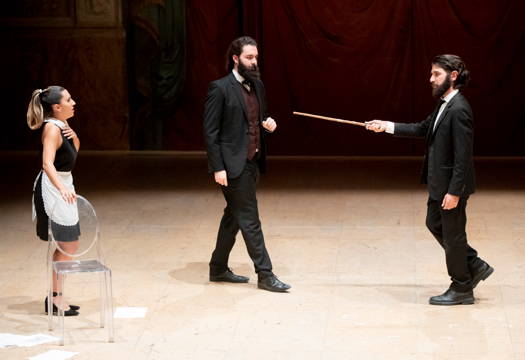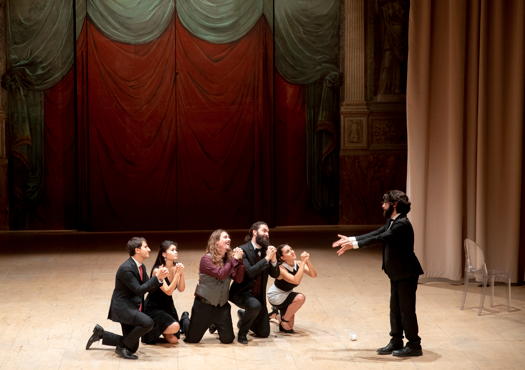 DISCUSSION: Defining Our Field - what is 'classical music' to us, why are we involved and what can we learn from our differences? Read John Dante Prevedini's essay, watch the panel discussion and make your own comments.
DISCUSSION: Defining Our Field - what is 'classical music' to us, why are we involved and what can we learn from our differences? Read John Dante Prevedini's essay, watch the panel discussion and make your own comments.
Promised in Marriage
GIUSEPPE PENNISI reports from Rome on
Rossini's first staged opera, asking
who pays 'The Promissory Change'?
Few remember that the first success of the then eighteen-year-old Gioacchino Rossini can be attributed to a very special promissory note: The Marriage Promissory Note, a farce in music that was performed for the first time at the Teatro San Moisè in Venice on 3 November 1810. This is not the first opera that the composer wrote - that was Demetrio e Polibio, composed in 1806, then completed and performed in Rome in 1812 - but it was the first to be staged.
With The Marriage Promissory Note, the Accademia Filarmonica Romana began on 11-13 October 2019, at the Teatro di Villa Torlonia, a very interesting project: to perform, in semi-staged form and with a simplified orchestral ensemble, the five farces characterizing the first period of Rossini's output; they include the germs (and sometimes whole numbers) of the future work of the composer. The five farces will be presented over a five-year period with young singers (from the Rossini Lab of the Accademia Filarmonica Romana) as well as young instrumentalists who have often just come from masterclasses at the National Santa Cecilia Academy.

From left to right: Agnese Gallenzi as Clarina, Ivan Caminti as Norton and Matteo Nardinocchi as Tobia in Rossini's The Marriage Promissory Note in Rome. Photo © 2019 Manuela Giusto
Rossini composed The Marriage Promissory Note to a libretto by Gaetano Rossi based on Camillo Federici's play of the same title. Rossini sat at the harpsichord and co-led all the Venetian performances. The story - very simple, but apt to provide the inspiration for tasty arias and spicy concertato (which fully reveal Rossini's early talent) - takes place in the 'elegant' living room of the house of the wealthy merchant Tobia Mill - Matteo Nardinocchi in the 13 October 2019 performance I attended. His daughter, the young Fanny (Sachi Nogami), was promised in marriage in spite of her own wishes, and behind the signature of a 'marriage promissory note', to the mature American businessman Mr Slook (Giulio Iermini). Fanny is instead in love with Edoardo Milfort (Edoardo Ferrari), a family friend, and, when Slook arrives enthusiastically from America to 'get his bride', the knots can only come to the comb. The young woman tries to dissuade Slook from proceeding with the 'purchase', while Edoardo - in a dimmer way - comes to threaten the businessman from overseas. When Slook is frightened, he tells Tobia Mill that he intends to give up the 'deal', and comes in full response challenged to a duel. Thanks to the intervention of the housekeepers, Norton (Ivan Caminiti) and Clarina (Agnese Gallenzi) - a happy end is still guaranteed: Slook will turn the bill for the benefit of the young Edoardo and, with good peace for all, the usual final rondo and concertato close the opera.

From left to right: Edoardo Ferrari as Edoardo, Sachi Nogami as Fanny, Giulio Iermini as Slook, Ivan Caminiti as Norton, Agnese Gallenzi as Norina and Matteo Nardinocchi as Tobia in Rossini's The Marriage Promissory Note in Rome. Photo © 2019 Manuela Giusto
Rossini was so interested in this youthful work that he transferred, lock, stock and barrel, a number - Vorrei spiegarvi il giubilo - to Il Barbiere di Siviglia. Director Cesare Scarton enhances the freshness of this work more than a grandiose edition that has been seen three times in Pesaro, at the Rossini Opera Festival. The orchestra is an ensemble of ten people, conducted by Giovanni Battista Rigon. The young instrumentalists produce elegant sounds perfectly suited to the small theater of 130 seats. Among the voices, the men's group seems more mature than the two women. Both the 'bassi buffi' and the baritone - and above all the tenor (to be followed carefully in his next steps) are of a good standard. In short, this was a very pleasant show which promises well for the future of the series.
Copyright © 30 October 2019
Giuseppe Pennisi,
Rome, Italy




